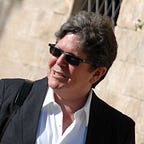That’s Entertainment — Hitler
Even now, some 90 years after the fact, we can still ask ourselves:
How was it possible that Adolf Hitler, a complete unknown; a failed painter; a man who had spent the past few years quite literally living in a homeless shelter, was able to take command and control of Germany, one of the most advanced and civilized countries in the world? How did he capture the hearts and minds of the nation that had given the world Beethoven, Schiller, Mann and so many other great thinkers and creators?
How was it possible that he was able to bring the burgeoning democracy of the Weimar Republic to its knees and drag both Germany and the rest of the world into a war of total devastation and destruction?
There’s an important lesson in here for all of us.
Hitler had one great skill — he was a great orator. He was in a word, entertaining. He knew how to woo a crowd. He also, apparently, according to Nancy Mitford, had a wicked sense of humor.
But the ability to be a great speaker and win over an audience is of limited appeal unless you have an audience. In a world before radio, very few people would ever have heard Hitler speak. But the invention of radio changed everything, both for him and for the world.
Radio was the first great electronic mass media. Radio was different. Newspapers, which had been around for nearly 200 years when Hitler first appeared, were inherently limiting. To get an additional reader you had to print an additional newspaper — that was expensive. And you had to get the physical paper into a new reader’s hands. Another problem. Radio solved that. One broadcast could reach an entire nation at no additional cost. It was a medium made for Hitler.
Suddenly, his very persuasive voice could be heard everywhere. There was only one problem — to hear Herr Hitler, you had to have a radio. Josef Goebbels solved this problem with the invention of the Volksempfänger, or People’s Radio (like the Volkswagen — people’s car). The Volksempfanger was cheap and easy to operate. Before the arrival of the Volksempfanger, hardly anyone in Germany posessed a radio reciver, they were too expensive. But Goebbels made sure that almost every home would now have radio.
This made a huge difference. Now regular Germans could hear the incredibly persuasive Hitler all the time. And it worked. They were won over. He was, sorry to say, extremely entertaning. He knew how to use his voice to win over a room or a nation.
Had television existed then, it is unlikely Hitler would have risen to the heights of power. He simply did not look like his Aryan Gods; he had nervous ticks; he walked in an irregular way, famously parodied by Charlie Chaplin in The Great Dictator. But radio and Hitler were made for each other.
We don’t live in a world of radio any longer — or newspapers for that matter. We live in a world of television. The average American now spends an astonishing 8 hours a day, every day watching TV or video of some kind. We spend 19 minutes a day reading.
We don’t need a Josef Goebbels to put cheap TVs into our homes — we carry them around with us in our phones all day long so we are never disconnected. We are watching all the time. We are a society based almost entirely now on ‘entertainment’. That is what we respect. That is what we admire. We are a consumate nation of ‘watchers’.
What happens when someone who really understands how to entertain a crowd on TV; how to dominate that medium, how to get into millions of homes every night and really wow the viewers takes to politics?
We are finding out right now.
